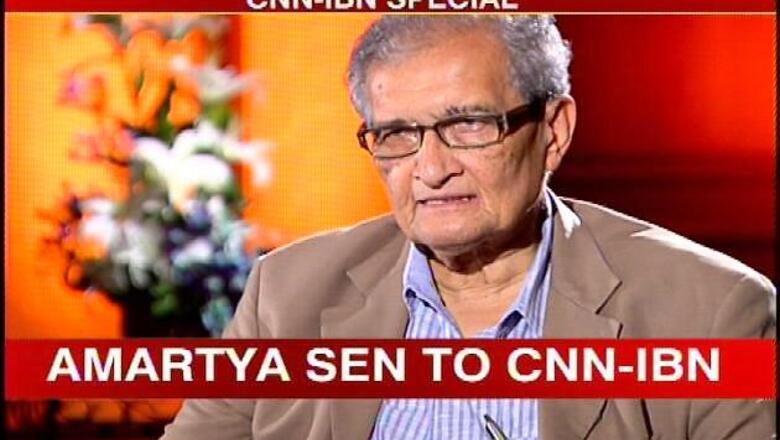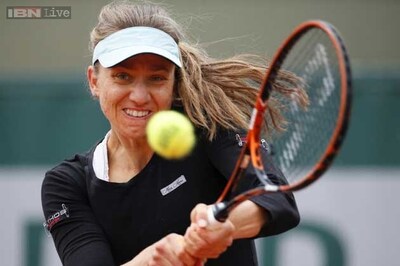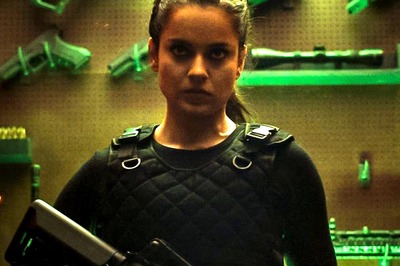
views
Author of 'Accidental India' Shankkar Aiyar joined IBNLive readers for an interaction on Amartya Sen vs Jagdish Bhagwati economic models.
Q. Mr Aiyar, What can we learn from both these points of view and why is the media hell bent on making this a fight between them? These are respected economist with different views on the way forward and I feel that we should learn from both instead of taking sides. Asked by: Jai
A. Prof Sen and Prof Bhagwati represent two views on how to engineer progress for the nation and prosperity for the people. Essentially the issue is about the hierarchy of objectives. Prof Sen tends to argue that investment in human indicators will eventually lead to development. Prof Bhagwati has argued that growth must be the principal objective and it will lead to other desired objectives.I dont think either is against growth or against human development. In my opinion Growth is a necessary condition for achieving sufficient human development. Basically someone -- the government in this case -- must pay for the investment in human development and these resources can only come from growth. I believe India needs both the Bhagwati and Sen models. I would lay emphasis on focussing on growth because that is what national and individual aspiration is all about.
Q. When the world is following a liberalized economy method and creation of wealth what is wrong if India is following it? Is minimizing corruption not the way to reduce poverty gradually? Asked by: Raghava Rao Karavadi
A. This is a question Indians have asked since Independence. India was among the most globalised trading nations in the 1800s. India's political class though - prompted by pride and paranoia - chose a closed economy. Even in 2013 the preference is for controls, permits and clearances because that is what funds the business model of politics. The choice - if it is - between the two models is artificial. It is predicated by political preference for what is electorally profitable.
Q. Sir, do you think Mr Sen or Mr Bhagwati should have avoided commenting on individuals and made their personal choices public? Should they have rather made observations on economic situation and solution to the India's economic problems? Asked by: Kishore
A. I would say both Prof Sen and Prof Bhagwati could have handled this much more gracefully.
Q. Does India need any expert to gauge the Indian economy. Decision taken in UPA - I are the real factors for today. All the hype was bogus. Everything was running with black economy now it has stopped thus is the result now. Why need experts it is just usage of television time - your take sir. Asked by: banukk
A. You cannot discount the value of knowledge, research and analysis - no matter who. India needs a wider deeper discourse on how its economy and development is managed and the current controversy is - unintentionally - achieving that.
Q. Do you think that since Bhagwati is a Ethnic Gujarati and Sen a Bengali, the difference in their opinions is a result of this. Gujarat and its people have always been Economically right wing, while Bengal despises Economic right? Asked by: Bruce
A. We shouldn't get carried away with ideas of identity and purported preferences. Prof Bhagwati has held his view for four decades and more and so has Prof Sen.
Q. Its beyond doubt that the Gujarat Model is not Modi's brainchild. But its a model nevertheless and a hugely successful one. So shouldn't it be considered to base your future growth direction upon(and not copied)? Do you think that Sen is over reacting with respect to HDI numbers in Gujarat? Asked by: Oliver
A. If political parties focussed on growth and worked to enable it through investment in human development to empower people we would not be having this debate. Unfortunately India's political system is structured around patronage for votes. That is the real tragedy.
Q. Are Amartya Sen and Jagdish Bhagwati really so influential on India's economic polices that the media is giving such a hype to them and their views? Asked by: Abhiram
A. Of course Prof Bhagwati and Prof Sen are influential thinkers and not just in India, the world over. What you are witnessing is a change in the Indian polity. Finally people are asking the relevant questions from their elected representatives and governments. And the debate between the two thoughts is part of the discourse we need to have.
Q. Dear Sir, what effect on this controversy will be on NaMo and/or Mr Sen? Asked by: Satya
A. I don't think either will be affected. The "controversy" is a sign of Indians asking the right questions.
Q. Socialism Vs Capitalism is an ongoing debate as that of Development Vs Eco management. Could it be that both economist may be right to hold on their point of view and media should not try to show it of as a big fight? Asked by: sundar1950in
A. World over the tussle in the tent of democracy has been about first charge on resources. It is not different in India. This debate is a bit wider and re-examines the focus of political objectives. It is good for democracy.
Q. Dear Sir, being a Nobelist and Bharat Ratna, does such comments are uncalled for, unwanted and prejudice. Asked by: Satya
A. Prof Sen has not lost/surrendered his right to express a view just because he was awarded a Bharat Ratna. Whether he is right or wrong, whether he votes or not nobody can take away his right to express a view. Like it or not, he has every right to express a view.
Q. Instead of open criticism of one another in public fora...shouldn't Sen and Bhagwati opt for a debate on a public channel and sort out differences and close the matter? Asked by: Rajesh Bhattad
A. It is a good idea. I agree maybe they should debate their views on a public platform. What I think is more important though is for Indians to participate and nurture the culture of debate and cast not "caste" their vote so that political parties are forced act in the long term interests.
Q. The only comfort POOR of the country can draw solace is they are being discussed every where, in economic models, in TV Studios, by eminent economists who perhaps have not encountered poverty in real terms. Now they have a price, the debate is whether it should be INR 12 or INR 33........In light of this, the point of view expressed by these two leading economists is a discussion point for the same audience. Why are they not able to explain the fact that even after 60 years of independence we are debating the models, and the reasons why the measure to alleviate poverty have failed, despite the fact that crores have been pumped. We know the number of villages, the number of districts, we have machinery and wherewithal, of they throw some light on how to implement the existing schemes it would be really great. Asked by: S ESHWAR
A. I have looked at this very question you are raising in my book Accidental India. Change comes to India only in the wake of shame and fear driven by crises. The transformation of India is therefore accidental.
Q. Dear Shankkar, do you think a truly "right of center" political party can ever come to existance in India, BJP is not right of center as popularly believed, something like mass based Swantantra Party? Asked by: arjun
A. The BJP was formed as a socialist party, whether the current leaders agree or not. It has fulminated against populism just as the Congress does when in opposition. India does need a right of centre party. More importantly India's national parties need to find out what they stand for - currently they can only articulate what/or who they are against. Yes without doubt India needs thinkers like Rajaji and B R Shenoy. It badly needs real heroes like C Subramaniam, Lal Bahadur Shastri, Verghese Kurien. We are saddled with the bonsai variety who have apportioned the glory that belongs to others.
Q. Political economy is necessary not only economics for development of this country. Asked by: kirti
A. There is - please remember- no politics without economics and no economics without politics. There is only one kind of economy and that is the political economy. This is true of India and the world.
Q. In Kerala the Human Resource Index is among the highest, but it has not transgressed in to development. Does this gives credence to the Prof Bhagwati model? Asked by: Daniel Godfrey
A. I don't think the goals of growth and human development are competitive. Indeed they complement each other. Kerala has done better than many countries and all Indian states in human development. There are many cultural, geographical and political reasons for this. It is also true that Kerala has consistently resisted industrialisation. But that is the will of the people of Kerala - if it was not so they would have elected governments that promoted industrialisation and job creation.
Q. East is East west is West. Will there ever be a synthesis of Sen-Bhagwati doctrines in India that could herald a new chapter in economy? Asked by: Arun Murthy
A. The divide being projected is largely artifical. The difference between the two thoughts is essentially on the hierarchy of goals. Prof Sen believes governments must first deliver human development and growth will follow. Prof Bhagwati argues focus on growth will force governments to do all that is necessary to achieve it and that will include investment in education, health and infrastructure. What India needs is a new matrix of what growth can be defined as.
Q. The UPA 2 is friendly with Amartya. Is that an irritant for Jagdish? Asked by: sundar1950in
A. The issue is far more complex. It is not about likes and dislikes.
Q. Dear Sir, Is it appropriate on Mr. Sen's part to single out his reservation on Mr Modi. Mr Sen's move seems rather contrived and political to personalize on an individual. Your views please. Asked by: Satya
A. Prof Sen is entitled to his opinion. Dissent is the essence of keeping democracy alive. Those who disagree are equally entitled to their opinion.
Q. Dear Sir, Mr. Sen's experience has ever been any help to India's economy. In what way he can be a panacea on the present economic situation. Asked by: Satya
A. Prof Sen's contributions to the understanding of poverty, human development and welfare economics has been lauded the world over. Do not discount the worth of knowledge. Everyone has a right to disagree with the model Prof Sen is propagating.
Q. Dear Sir, 2002 was not the first riot and god forbid may not be the last. But why other politician gets away with it and only Modi being demonised incessantly for something that occurs 11 years back in a state that has already moved on. And he's not convicted by any legal court. Isn't it very selective and partial on part of so called intellects and so called secular class Asked by: Satya
A. This debate is about the ideas of development of Prof Bhagwati and Prof Sen.
Q. Two academicians having different views is nothing new and wrong.Why so much hype on this by media? Asked by: sundar1950in
A. It is not hype. Understand the context. India now has a much larger middle class than every before. Indians are far better informed than ever before. Aspirations are far greater than ever before. Indians have finally begun to wonder why India can't do better. And therefore, I would argue, finally the Republic is awakening. Discourse is the bedrock of any democracy.
Q. Dear Sir, why Mr Sen or likewise sway away for their opinion on economic disaster and policy turmoil of UPA 2. Asked by: Satya
A. It is the turmoil in the economy that is creating the room for this debate. The questions are being raised and are embedded in this debate.
Q. An academician and a noble should avoid a controversy with politicians. Is Amartya on a turf in which he should not have entered? Asked by: sundar1950in
A. I disagree. Prof Sen speaks, writes and thinks on the political economy. This is par for the course.
















Comments
0 comment